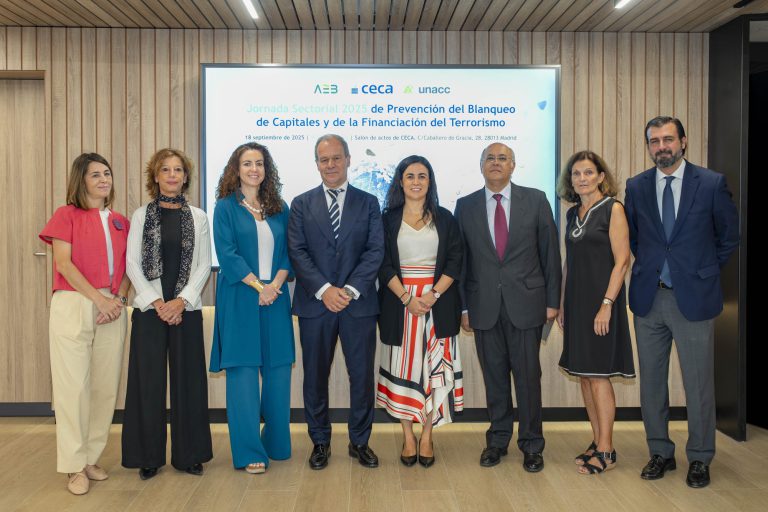The uncertainty is the sign of our time. We attended an international environment characterised by increasing geopolitical tensions: split of the multilateralism, commercial, armed conflicts or threats wars of use of the force. All of them define an outlook convulso in which major powers again compete for preserving spheres of influence, with direct implications for the financial stability. In this context, the European Union tries move forward in its objective of strengthening its hard power, and one of the strategic fields where looks for its new place in the world is the financier. The geopolitical risks have arrived to stay, and the companies must be ready to operate in an increasingly uncertain and volatile environment. Nos find, as have warned with clairvoyance the reports of Enrico Letta and Mario Draghi, before a paradigm shift that demands an agile adjustment to avoid a “slow throes”.
Our country's banking system faces these serious challenges from a position of strength. Thus it demonstrate principal indicators of financial performance. The return, measure via the ROE, reached 14.2% in the fourth quarter of 2024, considerably higher than 9.5% of the average of the Euro area. The ratio of efficiency presents also very healthy figures if we compare it with our European environment (44% when dealing with 55%). Furthermore, the non-performing assets ratio has been reduced remarkably in the last decade and it has remained restrained even during the recent bullish cycle of interest rates. In this lower cost context of the risk, the Spanish companies have strengthened its solvency levels and they maintain a liquidity position higher than that one of its European counterparts.
This solidity also is reflected in the dynamism of the claims on private sector, that it grew to double digit in the first quarter of the year, with a cost of financing lower than the European average in the main sectors. The best results derived from this good performance have been translated in an elder return to the company. Companies of the sector CECA invested in Obra Social more than 900 million euros in 2024, the great figure of the last 12 years. Of this investment have been nourished projects of all type: welfare, of promotion of the culture and heritage protection, for the promotion of the research and the local development. The strength of the financial system is today one of the lines principals of defense of our economy and supposes a significant contribution to our collective well-being.
Our account country's banking system, therefore, with cimientos solids to tackle the four major strategic challenges posed to short and medium term. The first one theirs is the review of the normative framework and supervisor. The European authorities have taken conscience of that the current regulation model and monitoring of the financial system results unsustainable, then is affecting negatively to the competitiveness of the continent's economy. Thus they have recognised it of way expresses the reports Letta and Draghi. Institutions, academy and industry have arrived at the consensus of that it is precise to simplify the legal system, free it of bureaucratic shackles that they burden the innovation and they widen our growth differential with respect to the economies with which compete.
This simplification owes be, therefore, ambitious. And a first field quickly in which must appreciate its effects is the prudent one, that is, requirements of solvency. After more than 10 constant reinforcement years of levels of capital by the sector, has arrived the time of introducing more flexibility in the model: limit the classical recipes based on the pure solvency to the traditional risks and permit new processing prudent based on the good governance for the emerging risks. Similarly, is precise to reconsider the current coverage system through eligible liabilities, insofar as simply such instruments' issuance supposes a disproportionate difficult cost of justifying. The taxation is another of the main challenges that faces the financial sector, since it is a source of improper distortions in the operation of the markets: increases the fragmentation, generates non equitable conditions and affects to the responsibility. In the case of Spain, the tax to the banking, that initially went conceived as a temporary levy, has planned a three-year validity. Although other jurisdictions have developed specific tax figures for the banking sector, the Spanish tax follows without having previous of similar impact in the European Union and lacks technical justification, especially as a result of the reduction of the interest rates.
The third challenge adverts to the role that corresponds to the banking sector in the two structural big transformations that is experiencing the economy of our time: the digitisation and the sustainability. In the digital field, the banking has replied with agility and effectiveness to the appearance of new competitors, as the fintech or even the bigtech, attracted by the innovation constant that characterises today to the banking business, most notably in the payment services. Precisely the irruption of new agents on the market demands establish an equitable regulatory framework, especially regarding the data management. Most recently, the development of the artificial intelligence has opened a new regulatory front: it is necessary to promote its adoption without ignoring the risks, looking for a balance between innovation and protection.
Furthermore, the sustainability is had become a transversal priority, but also in an increasing source of regulatory complexity. The standard has evolved in an accelerated way, with sometimes excessive demands or contradictory. The lack of one a fully defined taxonomy generates uncertainty on what activities can consider “greens”, hindering the decision making. It is urgent to define a clear and stable road map, with ambitious goals but reachable, and that it distributes accountability of balanced way, without moving to the disproportionate financial sector loads.
Lastly, the Banking Union in the EU is still incomplete. The second pillar, the so-called Only Mechanism of Resolution, still presents key deficiencies given that there are uncertainties on the parameters that they have guide to the authorities in the management of companies in crisis situation. When it comes to the third pillar, the European system of deposit insurance follows without materialising. While this mutual fund is not established will not have a real Banking Union: the depositors will follow exposed to inequalities between countries and the banks will be linked to the sovereign risks. The efforts undertaken to date for moving forward in the definition of an European model have lacked the enough supports within the European institutions.
The regulation and the monitoring have been and they will be still essential pillars for the financial stability. But so that the banking sector can follow moving forward is necessary to build a lither frame, coherent and balanced, that, far from hindering, help to the financial institutions to manage successfully this was of the uncertainty.













